An 'air of unpredictability' in Reynosa
A Q&A with Solidarity Engineering's Erin Hughes about changes in the border city where her humanitarian organization keeps migrants healthy.
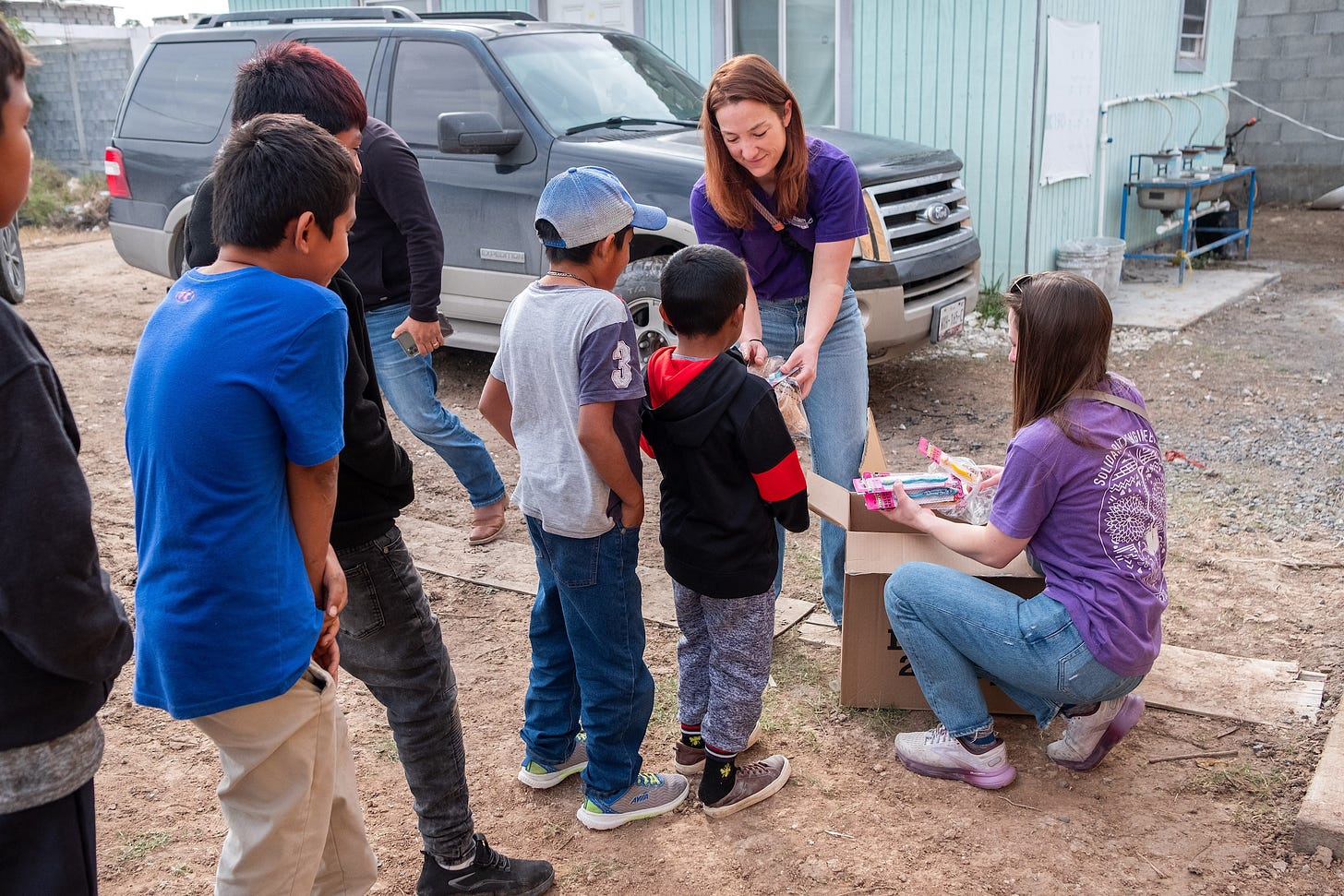
I caught up with Erin Hughes of Solidarity Engineering last week to learn how things have changed in the border city of Reynosa since Donald Trump returned to the White House. Erin is co-founder of the humanitarian organization that has been working to provide safe and sanitary conditions for migrants, especially women, since 2020.
The population of migrants in Reynosa shelters is relatively low, but that’s likely to change. Mexican authorities are expecting an influx of people deported from the U.S., in addition to an increase in migrants coming from the south.
Here are excerpts of my conversation with Erin, edited for length and clarity.
What was it like in Reynosa after the November election up to Jan. 20, and what has changed since Trump regained power?
From November through January, people were still coming to the border and trying to present themselves to get an appointment (to seek asylum). There was a crazy rush. Right before the inauguration, you could feel the anxiety from everybody. His first day in office he canceled all of the CBP1 appointments, so since then the population has really decreased. At Senda de Vida 2, which historically has been the largest shelter and encampment that can take on the most people, there's only 60 people there right now. Two or three years ago there were maybe 3,000 people there. It was way too crowded. At Senda 1 there's probably 450 people, and at the Rio camp there's barely anyone there. At Casa de Lulu, her populations at two shelters have been pretty consistent, 40 and 50 people. We're supporting all these places by providing water, hygiene supplies, community sanitation supplies like bleach and mops and brooms and stuff. We're still keeping the operations and maintenance up for all the bathrooms, the showers, the laundry facilities, the park and playground at Senda 2. They need all of these services. There's probably only 20 kids left at at Senda 2, but we're still doing our weekly STEM class there. They love it.
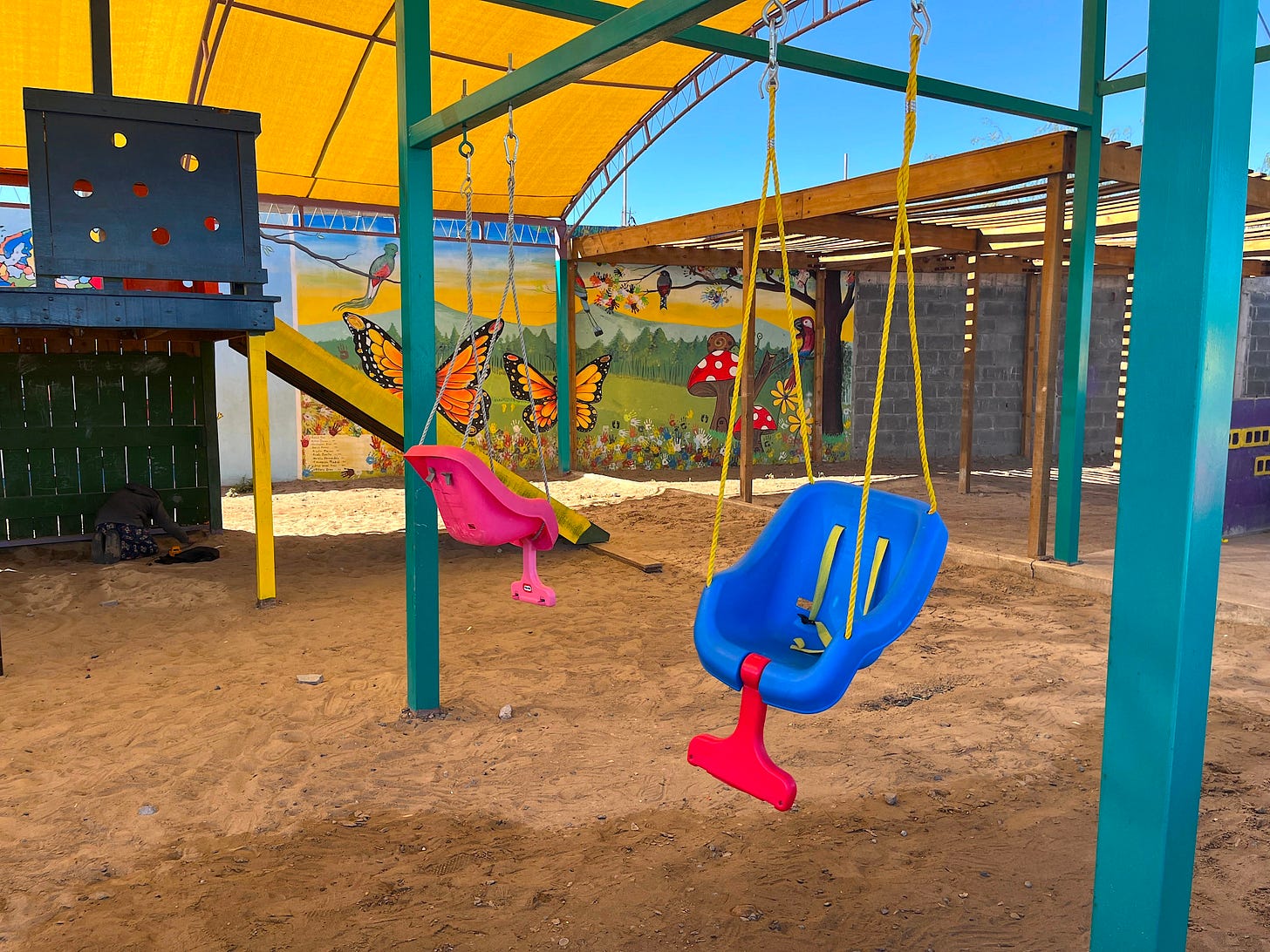
The people in the shelters now — have they been recently deported from the U.S. or have they been in Mexico the whole time waiting to cross?
Everyone remaining is kind of at the point where they don't know what to do because their (asylum) appointments have been canceled — there are lots of Venezuelans and a good amount of Guatemalans, Hondurans and El Salvadorans. And so these are the people that don't want to cross illegally but can't go home. They're just like, “I don't know what to do with myself. Do I wait it out longer?” There's just this air of unpredictability and they don't know what to do. I feel for them. They're just in this limbo. The cartels, since probably September, they've gotten pretty violent and pretty bold. And even most recently over the past month and a half, they are really making themselves known as the authority. Lots of folks have been just beaten to shit. (One man) had his skull bashed in and he just showed up at Lulu’s door one day and she had to bring him to the hospital.
I’ve read about the Mexican government taking people from near the border and dumping them in Chiapas or elsewhere in the south. Is the new Mexican government helping migrants or making it worse for them?
My understanding is that they aren't giving migrants travel visas to travel within Mexico. So when people present themselves in Mexico and say they’re on their way to the United States to apply for asylum, they essentially get stuck in these southern cities. Right now we opened a project in Tapachula, a busy crossing town from Guatemala. I know a migrant down there who I met in Matamoros. He crossed into the United States and I was his sponsor. He went to one of his monthly ICE appointments and they detained him and locked him up for 10, 11 months and eventually deported him back to Honduras. Then he traveled back up and now he's kind of stuck in Tapachula. I've been in communication with him this whole time, and he was like, “Please hire me, there's nothing else for me to do down here.” So he's essentially our Solidarity Engineering staff down in Tapachula, distributing water and hygiene supplies and community sanitation supplies at all the shelters down there.
What’s the status of your funding, with all the cuts imposed by Trump?
Solidarity Engineering has never gotten U.S. federal funding. I've tried and it's been such a pain to get all of the necessary approvals, and it's very restrictive. And so I was like, you know what, we can get private funding and individual funding. So I’m thankful that we're not relying on any U.S. federal funding. But that being said, a lot of the USAID money was funding UNICEF and UNHCR and contracting out DRC, the Danish Refugee Council. A few months ago, we had just started a WASH cluster (Water, Sanitation and Hygiene) and we were splitting costs and coordinating with DRC and UNICEF. We were going to handle water at all these locations. At the time there were 20 porta potties at Senda, a big expense, and so we were (going to share costs with) UNICEF. Then after USAID lost all of their funding, UNICEF, UNHCR and DRC within three days of that announcement pulled all of their people. We were on the phone with them, asking, “But what about this agreement, all of this work that we've been doing, coordinating and partnering for the past few months?" And they were like, "We're literally out of money." So we’re trying to play catchup, losing these partners and now we have to pick up the slack.
Tell me about Mujeres Rising. That's a new initiative, right?
It's for International Women's Day and Women's History Month. We're doing this fundraiser and we're focusing on all of the women's needs and women's stories in particular — lots of interviews with the women we’re helping and women leaders at the border. There's just so many incredible women-led organizations. And then in general the experience for the women migrants at the border is so different than the men's. Unfortunately rape and sexual assault is very common, so they have to worry about that. Then typically the women are the ones taking care of the kids and the family. So there's that layer on top of it. And then they have to worry about managing their menstrual cycles. And so there's just layer upon layer upon layer that women have to deal with that is just extra tough for them. So we're hoping to give them a little bit more of a voice and hoping that this fundraiser and this campaign can do that and just highlight them a bit more.
Is that connected to the Women’s Health webinar coming up on Wednesday?
We're partnering with Villa Therese, a clinic in New Mexico. Because they're a free clinic, they end up seeing a lot of the migrants who cross. What Solidarity Engineering does, even though it's not inherently health care, it's kind of preventative health care — giving people clean water and soap and menstrual pads and diapers for their kids and toothbrushes and toothpaste to keep their gums and their teeth clean. All of this stuff is keeping people healthy while they're in the camps, keeping their tents and living conditions more humane, and they're way less likely to have issues in the future. Villa Therese will have a woman on the panel and then we're inviting Lulu (Lourdes González) to be our special guest. We're just going to be asking these women what their experience is and and how they've gotten involved and what challenges being a woman has brought to this, and just highlighting these incredible women that are doing amazing work. (Register here for Wednesday’s webinar, 7 p.m. Eastern.)
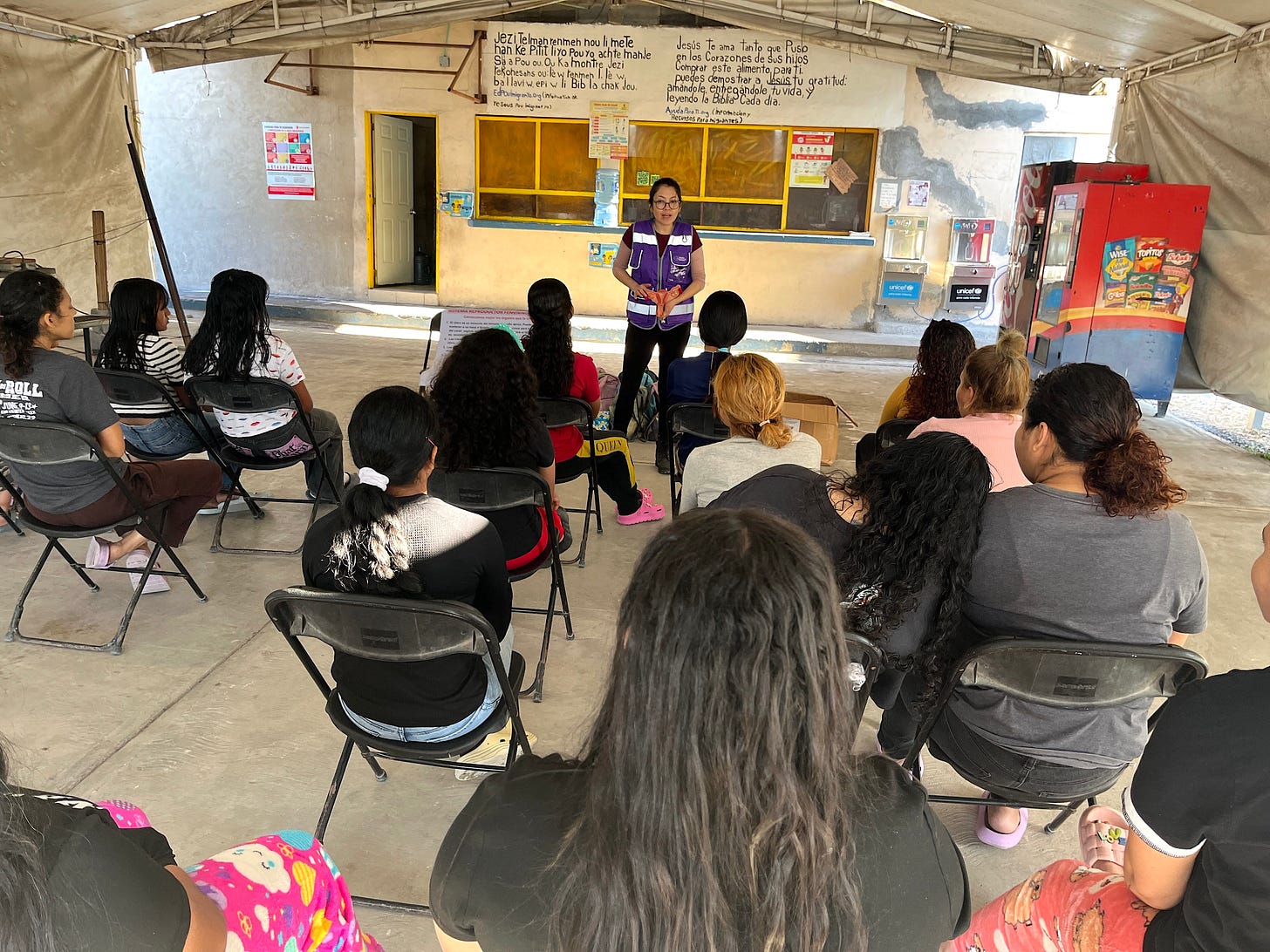
What do you expect will happen next in Reynosa as far as the migrant population?
Pastor Héctor Silva, who runs the Senda shelters, said the Mexican authorities are telling us that thousands of people are going to come in a few months. So we’ll just prepare, and then if nobody comes, then we’ve just bolstered up these these shelters and we can maybe use them for other vulnerable populations. We're doing this big solar project. We're working at another little Mexican school, doing a playground and doing improvements there. But we can’t get too comfortable with these low populations, because migration ebbs and flows naturally. It's just at a low point right now because of Trump and and everyone's kind of holding off to see what's going to happen. But we’re probably going to see a bunch of people coming from the south in a few months or next year. There's going to be a breaking point for all of these people that are staying where they are, either in Haiti or Venezuela or Honduras or wherever. They're holding off as long as they can, but there's going to be an uptick.
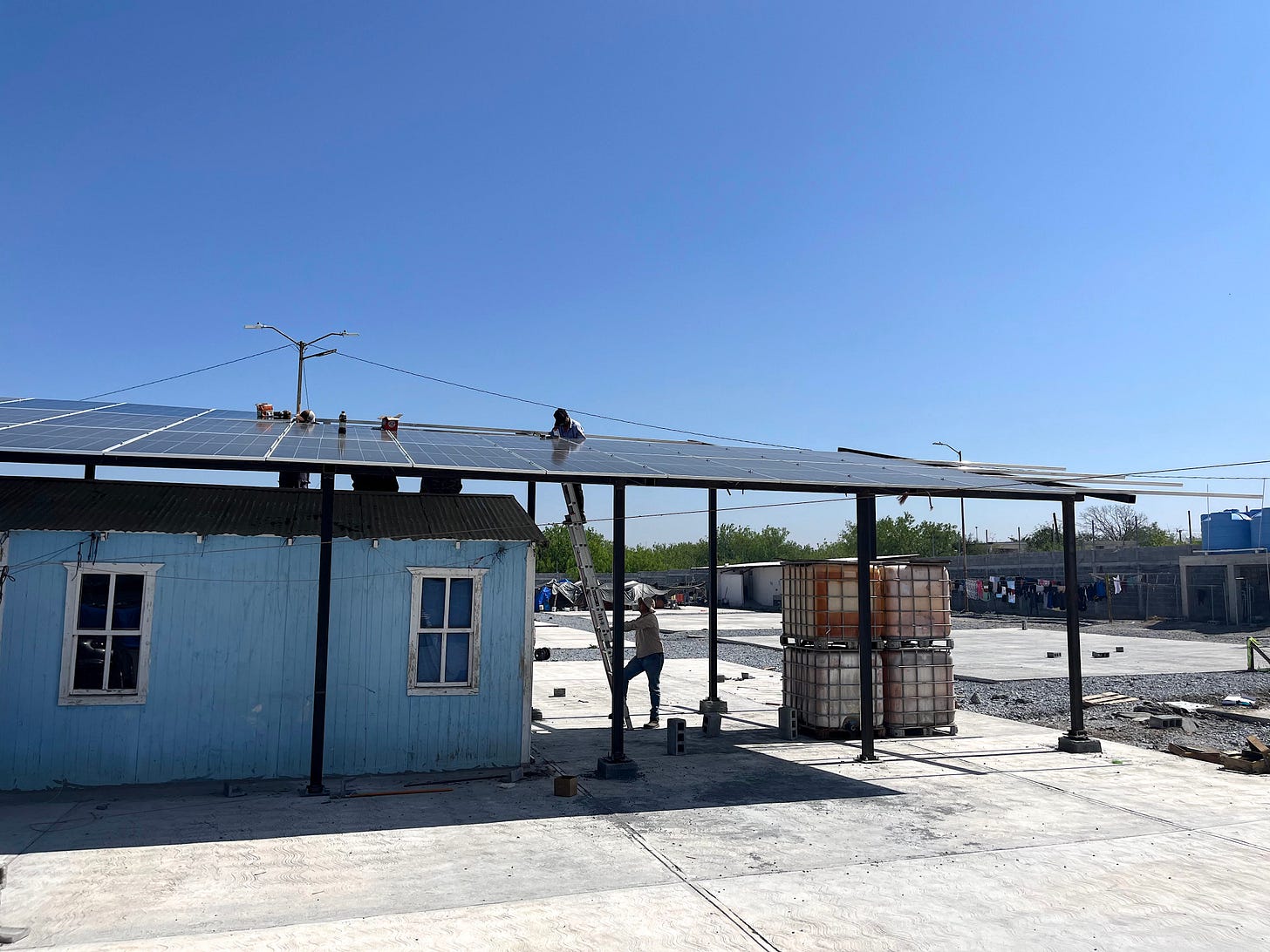
Can you share any recent stories about folks who are stuck there now, so that people might see that the migrants are human beings just like us?
Because our name is Solidarity Engineering, a lot of folks will come over and tell us they were engineers in Venezuela or another country. Just hearing that, when someone says that, “Oh, yeah. I have my degree. I was working as a civil engineer at home in Venezuela” — and now he’s living in a tent with his family. It just hits you particularly hard. This literally could be me. That could be me. So just seeing yourself in these people. It happens all the time. Now that I have a daughter and I see these little kids and when (my daughter) naps, I have blackout curtains, a sound machine. I have her room at 70 degrees. It's perfect. At the shelter I see these babies napping and they have a “pack and play” outdoors and their baby is just napping and it’s 100 degrees.
What can people do to help in general and to help organizations like yours at the border? Donating money is always good, right?
Right now it's just pretty much donating. We’re just trying to respond where it’s needed the most. We don't have any big projects for volunteering in person, but I think advocacy work, just spreading the word about what's going on and talking with your neighbors about how migrants and asylum seekers and deportees are not this scary thing that people think that they are. They're just people.
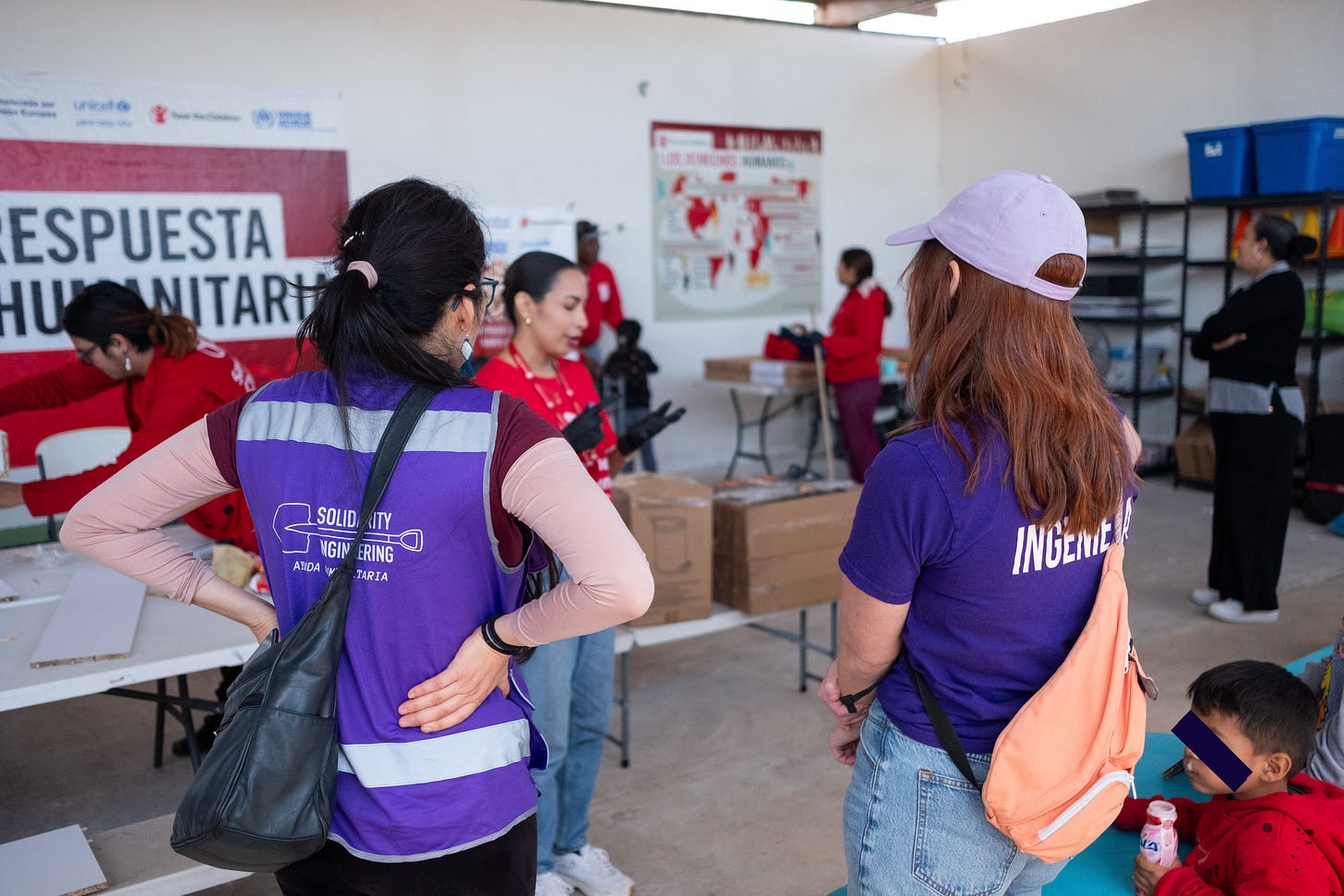
.




Thanks, Jim! Great interview! What an organization! 💪🏼🦋💜